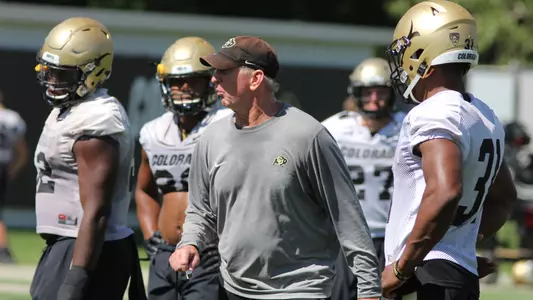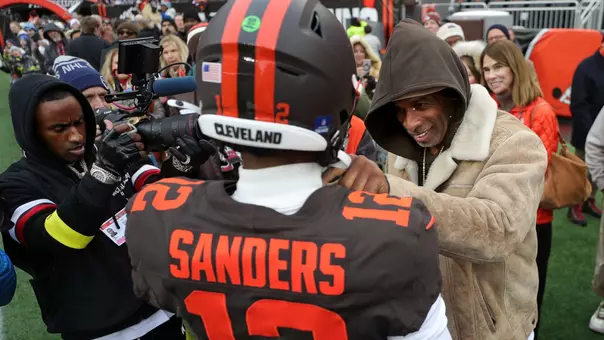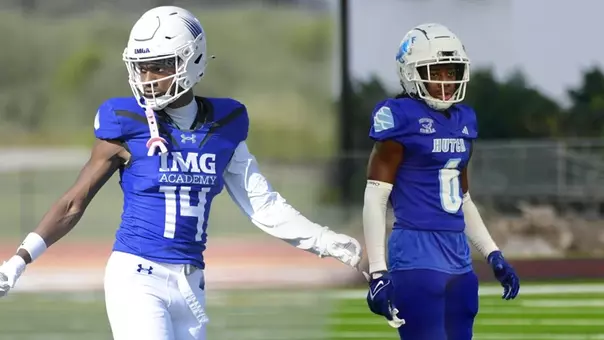Colorado University Athletics

Buffs Not Swayed By Stanford's Recent Offensive Struggles
October 20, 2016 | Football, Neill Woelk
BOULDER — Colorado defensive coordinator Jim Leavitt doesn't spend much time perusing the media.
Thus, Leavitt isn't buying the reports of the demise of the Stanford offense. All Leavitt sees is a big offensive line, a big blocking fullback, a pair of quality tight ends and — of course — last year's Heisman Trophy runner-up.
"They're good," Leavitt said earlier this week. "Don't let anybody tell you different. (Christian) McCaffrey can hurt you. Look at what he's done. No. 35 (fullback Daniel Marx) is a player. No. 20 (running back Bryce Love) can run the ball. They can block. They have good tight ends. We've got our hands full, I know that."
The storyline this week is that the Cardinal's offense is struggling. McCaffrey, recovering from an unspecified injury, sat out last weekend's game against Notre Dame and is still questionable for this week's game — although the Buffs expect him to play.
Meanwhile, the Cardinal offense has scored just one touchdown in each of Stanford's last four games, and the once-powerful rushing attack is currently just 96th in the nation, averaging just 146.7 yards per game on the ground.
But it's still Stanford — and while the Cardinal's recent struggles have been well-documented, the Buffs also know that Stanford dominated USC earlier this season, 27-10, holding the Trojans to just 117 yards on the ground while putting up 404 yards total offense.
"I've been impressed with what they're doing," head coach Mike MacIntyre said. "Coach (David) Shaw does an excellent job with them. They're big, powerful. Their best player didn't play last week and got beat up a little bit in the game before, but I imagine we'll see Christian (McCaffrey) or I expect we would. They went to Notre Dame and won there without their best player; I think that's pretty impressive."
If McCaffrey is healthy, he no doubt brings a dimension to Stanford's offense that's hard to stop. He opened the season with 126 yards rushing and 40 yards receiving in a win over Kansas State, then had his best game of the year when he ran for 172 yards and a touchdown and added 66 yards receiving and a score in the win over Southern Cal.
McCaffrey then added 138 yards on the ground in a 22-13 win over UCLA, but was limited to just 49 rushing yards in a 44-6 loss to Washington and had only 49 yards in a 42-16 loss to Washington State, a game in which he left midway through the third quarter with an injury.
But a year ago, it wasn't just McCaffrey that hurt the Buffs in a 42-10 Stanford win in Boulder. Colorado also gave up three catches to tight end Austin Hooper, including a 28-yard scoring throw — from McCaffrey.
Tight ends have been a thorn in the Buffs' side this year. In CU's 45-28 loss at Michigan, the Wolverines' leading receiver was tight end Jake Butt, who hauled in seven catches for 87 yards, including some big third-down receptions. In CU's 21-17 loss at USC, tight ends accounted for all three Trojan touchdowns, with Tyler Petite (two TD catches) and Daniel Imatorbhebhe (one score) combining for four catches for 63 yards.
Hooper is gone this year from the Cardinal's roster, but Stanford does have a pair of solid tight ends in Dalton Schultz and Greg Taboada, who have combined for 18 catches for 134 yards this year. Taboada, a senior, is averaging 19.3 yards per catch this season and 16.2 for his career.
Defending a tight end is becoming more and more difficult for defenses because fewer and fewer teams are utilizing tight ends in their passing game, including Colorado (only three receptions this year have gone to Buffs listed as tight ends/H-backs on the roster). When teams don't utilize their tight end in the passing game, their defenses aren't accustomed to seeing it in practice. Then, when one does arise, it's a more difficult task.
"You've got to adjust," Leavitt said. "We see a lot of different things. These guys (Stanford), they do a lot of things well. It's a good football team. They're going to use their tight end, use their fullback and run the ball on you. We've got to play a heck of a game if we're going to stop them."
SCORING DEFENSE IMPROVING AGAIN: After making a big jump in the defensive statistical category that counts the most — scoring defense — the Buffs are on their way to taking another big step forward this year.
After seven games, the Buffs are giving up an average of just 20.0 points per game, good enough for 27th in the nation and third in the Pac-12, where they trail only Washington (14.2) and Utah (18.3).
A year ago, the Buffs shaved nearly 12 points from their points allowed total. After giving up 39 points per game in 2014, they dropped that number to 27.5 in 2015.
Thus far this season, they've shaved another touchdown per game off that number — and the statistic would be even better had CU not given up a pair of special teams touchdowns at Michigan this year. Take those 14 points off CU's total, and CU's defense is actually yielding just 18 points per game — a number that would put them in the top 15 in the nation.
CU-STANFORD SERIES NOTES: Last year's game against Stanford was MacIntyre's first against the Cardinal as CU's head coach. He was 0-2 against Stanford at San Jose State. … The Cardinal holds a 6-3 series edge, with wins in the last five, three of which have come in Pac-12 play. … The last CU win in the series was a 21-17 victory in Boulder in 1990, made possible when Eric Bieniemy scored on a fourth-and-1 play with 12 seconds left in the game. … This will be the first time in the last seven games between the two schools that at least one of the teams hasn't been nationally ranked.
Contact: Neill.Woelk@Colorado.edu





